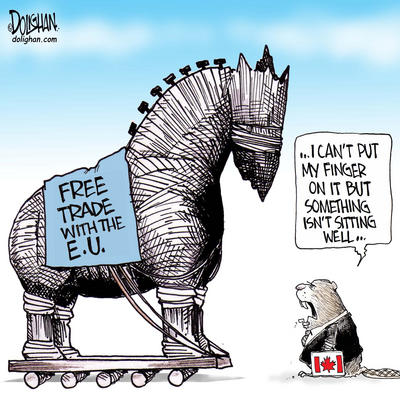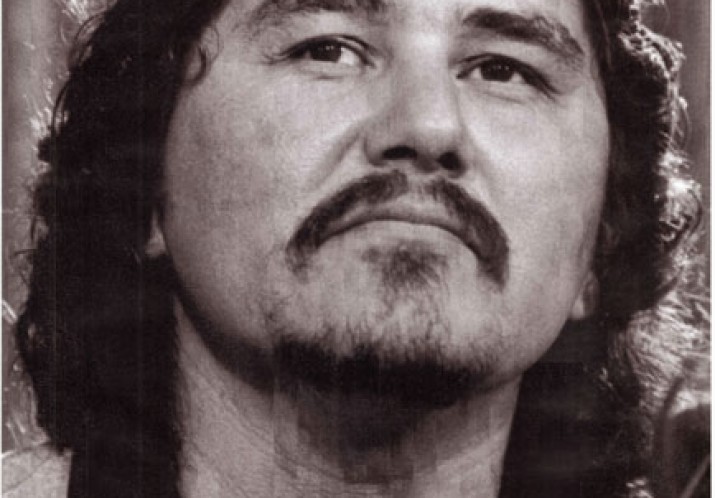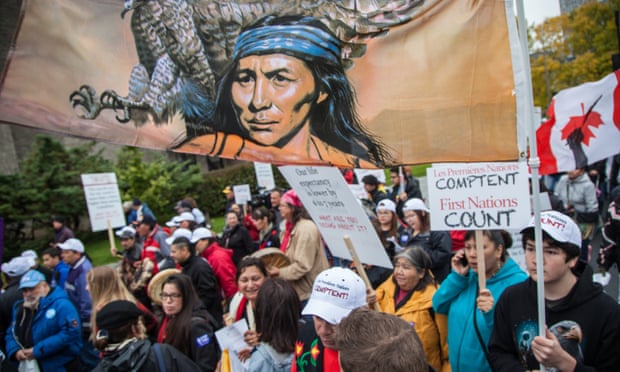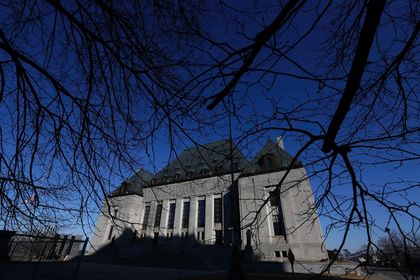PM @JustinTrudeau, Sophie w guest of honour Bill Graham and his wife Cathy. #cdnpoli pic.twitter.com/bzs5ApcqkA
— Canada 2020 (@Canada2020) April 12, 2016
@Canada2020 Attawaskapit issues were not important enough for Justin to cancel socializing & show up in HOC re emergency debate
— One Woman (@Outofnames) April 14, 2016
By Victor Ferreira, reposted from the National Post, Apr 14, 2016
TORONTO — Several groups of indigenous activists have occupied the offices of Indigenous and Northern Affairs Canada in Toronto and staged a sit-in in Winnipeg, demanding that Justin Trudeau visits a northern Ontario community struggling with a recent spate of suicide attempts.
A group of about 30 people first occupied the Toronto building around 10 a.m. on Wednesday morning, police said. More than 30 hours into the protest, it continues to be peaceful, police said. A second group of activists staged a sit-in in the Winnipeg INAC office Thursday evening.
Maanii Oakes, a protester in the group occupying the office said the group is disappointed to not have received a response from the federal government.
“We thought this was going to be a one-hour action,” Oakes said. “Unfortunately by the response we got that Prime Minister (Justin) Trudeau would not be there…it seemed as if INAC was not the best option for First Nations people and we needed to be here to pressure him to come to Attawapiskat.”

Trudeau was visiting Fanshawe College in London, Ont., and Polycon Industries, a automotive parts manufacturer in Guelph, Ont., Thursday.
In Toronto, the protesters are demanding that Trudeau address the crisis in Attawapiskat, a First Nations community dealing with the aftermath of a large number of suicide attempts over the weekend. The group is also calling for a list of more than 20 demands to improve the community, including a youth centre, elder camp, emergency mental health responders, firefighters and libraries, to be met.
Protesters staged a “die-in” in the INAC office and hung up Attawapiskat First Nation and Mohawk Warrior Society banners on Wednesday. The group has been cut off from washrooms and have been forced to use buckets instead. Oakes said the group was told that if they leave the building, they will not be allowed to re-enter. Deliveries of food, water and toilet paper from other activists outside the building have been allowed, but on an inconsistent basis. At least one young child and several senior citizens are among the protesters occupying the building’s 8th floor office.
When the group first occupied the office Wednesday, Oakes said there were a handful of INAC staff workers inside. On Thursday, Oakes said the activists hadn’t seen any workers inside the office.

The Attawapiskat community declared a state of emergency Saturday after reports of 11 suicide attempts taking place in one day. On Monday, police thwarted a suicide pact between 13 young people in the community, including a nine-year-old.
Melisse (Coyote) Watson, another protester occupying the Toronto INAC office, said the group needed to raise attention for Attawapiskat because “people have gotten used to the way indigenous people on this land have been living.”
“It’s had to go beyond a reasonable point for people to start noticing and I think it just goes to show how normalized the conditions on reserves (have become),” she said.
Both Oakes and Watson said the group has not been yet been contacted by the provincial or federal government. But Ontario Health Minister Eric Hoskins and Children and Youth Services Minister Tracy MacCharles visited the community Wednesday, pledging $2 million in mental health support. On Tuesday, the House of Commons held an emergency debate on the future of the community.
ATTAWAPISKAT VIDEO
Health Canada also dispatched 18 health workers, mental health workers and police to help support the Attawapiskat community.
But aboriginal activists don’t think that’s enough, Oakes said, spurring action in Toronto and Winnipeg.
Winnipeg police Const. Robert Carver confirmed that protesters had entered the city’s INAC offices, but avoided using the term “occupied” because he said staff are allowing the group of 20 activists to be inside the building.
“An occupation is where they’re no longer welcome and they’re not leaving,” Carver said. “They are currently being allowed to smudge by the INAC staff.”

Access to the building’s front entrance has been cut off by security officers who are only allowing people with keycards through the front door. In Toronto, building security has made the same decision.
Toronto police said their role in such protests is “neutral” and have no plans as of Thursday morning to forcibly remove the protesters from the building. Several officers are currently in the office’s lobby to ensure the protest remains peaceful.
A smaller group of activists remain at their posts outside the Toronto building’s front door, gathering supplies and raising awareness for the protesters and the crisis in Attawapiskat. Some burned sage and wafted the fumes towards their faces in a ceremony meant to cleanse their souls. Others held hands and formed a circle to pray for the well-being of the protesters inside and the citizens of Attawakpiskat.
Multiple posters laying out the group’s demands and support for the embattled community clung to the exterior walls, drawing the attention and questions of curious Torontonians passing by.
Oakes said the group inside the building and another one outside are ready to continue their protests if their demands aren’t met.
“We’ve got buckets, we’ve got medicine, we’ve got water, we’ve got food,” Oakes said. “I think we’re more than enough prepared to make sure the youth in Attawapiskat gets the justice they deserve.”




